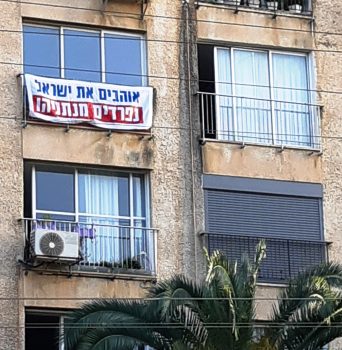Election Day in Israel 2020 Posted by Ayana on Mar 2, 2020 in Uncategorized
Legislative elections for the 23rd Knesset will be held in Israel on March 2, 2020. Every election is different. As the third election held within a period of 12 months, this one is especially tense. But there are things that never change on the Election Day (יוֺם בְּחִירוֹת).
Israel Election Day starts early. The polling stations (עֶמְדַּת קַלְפִּי) open their doors at 7 a.m. As they open the campaigning (תַּעֲמוּלָה) begins, in a last attempt to convince (לְשַׁכְנֵעַ) the remaining floating votes (קוֹלוֹת צָפִים), on their way, and even on their arrival, to the polling station. The Knesset Election Law prohibits campaigning inside the station. A voter isn’t even allowed to mention the candidate he is voting for. Outside, though, it is bustling: parties’ banners hang on every fence and wall, party activists (פְּעׅילֵי מִפְלָגָה) wearing their party’s colors, distribute their party’s polling notes, and start an electoral argument with every passer-by.
Election Day in Israel is a celebration of democracy. Voting is not compulsory, and yet Israel voter turnout (אָחוּז הַצְבָּעָה) is pretty high, almost 70% in the last elections of September 2019. לְכוּ לְהַצְבּׅיעַ (go vote) is the slogan of the day. Updated turnout figures are published on radio and television throughout the election day. Israeli politicians and journalists consistently exhort (לְהַפְצִיר) the citizens to spend this sabbatical day to exercise their right to vote (זְכוּת הַצְבָּעָה). The Central Elections Committee came out with a new campaign to encourage voting. אֵין לָכֶם זְכוּת לְוָותֵּר עַל הַזְּכוּת (you have no right to give up on that right) is the slogan of their campaign:
Among the first voters are usually the politicians themselves, in an effort to encourage (לְעוֹדֵד) people to do the same. Plus, they are beginning a busy day, the last day of their election campaign. Since Israeli voters are only allowed to vote in the polling station assigned to them – the one adjacent to their house – it is more convenient to do it first thing on the morning. Benny Gantz, for example, who is running for the prime minister, got up early to vote in his hometown on September 2019 election and then drove north to Haifa to persuade (לְשַׁכְנֵעַ) people to vote. His party member, Yair Lapid, went to the beach and the park of Tel-Aviv, hoping to influence (לְהַשְׁפִּיעַ) the turnout. Prime minister Benjamin Netanyahu woke up and went to vote with his wife. To the cameras he said: אֲנִי קוֺרֵא לְכָל אֶזְרְחֵי יִשְׂרָאֵל לָבוּא וּלְהַצְבִּיעַ (I urge all the citizens of Israel to come and vote), but since he was inside the polling station he refrained from saying for whom.
The law prohibits publishing polls (סְקָרׅים) in the five days preceding election day. It doesn’t mean the pollsters are resting. They continue to work, to collect and analyze information, and getting ready to the poll everybody is waiting for – the exit poll (תּוֺצְאוֺת מִדְגָּם הַבְּחִירוֹת). Three Israeli TV channels compete for ratings at the end of the election day, and broadcast their own exit poll at 10 p.m. Each channel has its own pollster (סוֹקֵר), each wishing to be the most precise. Not only his personal prestige is at stake, but the prestige of the entire channel. The next video presents a collage of the three exit polls from the elections of 2015:
At 10 p.m. the polling stations shut down, and the counting of the votes (סְפׅירַת הַקּוֺלֺות) begins. The count takes about twelve hours, and the results are published the next day. In previous elections, when it was clear from the exit poll who is the winner, the victory party began immediately, and the candidates delivered their speeches in accordance to the results (תּוֺצָאוֺת). But the last two elections taught us that the elections are only the beginning. Forming a coalition is the real assignment. For more information and vocabulary check out our previous posts:
What to Know Before the Israeli General Elections
Israel Second Election in 2019
Behind the Scenes of Israel 2019 Election
How to Use the Hebrew Verbs to Elect, to Vote
Text vocabulary
Election Day = יוֺם בְּחִירוֹת
Polling place, polling station = עֶמְדַּת קַלְפִּי; in spoken language will usually be shortened to just קַלְפִּי.
Campaigning = תַּעֲמוּלָה
To convince = לְשַׁכְנֵעַ
Floating votes = קוֹלוֹת צָפִים
Party activists = פְּעׅילֵי מִפְלָגָה
Turnout = אָחוּז הַצְבָּעָה
To vote = לְהַצְבּׅיעַ
To exhort = לְהַפְצִיר
Right to vote = זְכוּת הַצְבָּעָה
To encourage = לְעוֹדֵד
To persuade = לְשַׁכְנֵעַ
To influence = לְהַשְׁפִּיעַ
Poll = סֶקֶר
Exit poll = תּוֺצְאוֺת מִדְגָּם הַבְּחִירוֹת
Pollster = סוֹקֵר
Counting of the votes = סְפׅירַת הַקּוֺלֺות
Result = תּוֹצָאָה
Keep Calm and Vote!

Build vocabulary, practice pronunciation, and more with Transparent Language Online. Available anytime, anywhere, on any device.





